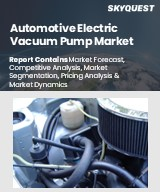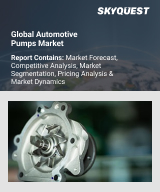
|
시장보고서
상품코드
1744656
자동차 연료 이송 펌프 시장 예측(-2032년) : 유형별, 차량 유형별, 연료 유형별, 재료별, 판매 채널별, 용도별, 지역별 분석Automotive Fuel Transfer Pumps Market Forecasts to 2032 - Global Analysis By Type, Vehicle Type, Fuel Type, Material, Sales Channel, Application and By Geography |
||||||
Stratistics MRC에 따르면 세계의 자동차 연료 이송 펌프 시장은 2025년 26억 달러를 차지하고 예측 기간 동안 CAGR 6.8%로 성장해 2032년까지 42억 달러에 이를 전망입니다.
자동차 연료 이송 펌프는 연료를 탱크에서 엔진으로 효율적으로 이송하기 위해 설계된 자동차에 필수적인 부품입니다. 승용차, 상용차, 산업기계에서 일반적으로 사용되고 있으며, 첨단 연료 이송 시스템은 내구성과 효율성을 도입하여 연료 낭비를 줄이고 차량의 신뢰성을 향상시킵니다.
인도자동차공업회(SIAM)에 따르면 인도 자동차 판매량은 2024년 과거 최고의 2조 5,000억대에 달하고, 2023년부터 11.6%의 성장을 기록했습니다.
자동차산업의 지속적인 확대
특히 신흥 시장에서 자동차 생산대수가 증가함에 따라 제조업체는 다양한 엔진유형을 지원하기 위해 보다 효율적인 연료공급시스템을 필요로 하고 있습니다.
배터리 전기자동차(BEV)로의 세계적 변화 증가
세계 이니셔티브가 넷 제로 방출과 화석 연료 의존 감소를 추진하는 동안 BEV는 특히 유럽, 중국, 미국에서 시장 점유율을 확대하고 있습니다.
급속한 도시화 및 모터화
소득 수준의 향상, 중간 소득층의 확대, 자동차 대출에의 액세스의 개선에 의해 이러한 지역에서는 자동차 소유율이 높아지고 있습니다. 동시에, 교통망과 물류 인프라의 확대가 상용차의 필요성을 높이고 있어 연료 이송 시스템의 사용이 한층 증가하고 있습니다.
내연엔진(ICE) 연비에 대한 우려 증가
세계의 연료 가격의 불안정성이 계속되고 환경에 대한 우려가 높아지는 가운데, ICE차의 연비에 대한 감시의 눈이 높아지고 있습니다. 연료 시스템 부품의 소형화나 폐지로 이어질 가능성도 있습니다. 규제 당국도 배기가스 기준을 엄격하게 하고 있기 때문에 종래의 연료 이송 펌프에 한층 더 개조나 기술 혁신이 필요할 가능성이 있어, 시장의 성장을 방해하고 있습니다.
COVID-19의 영향:
COVID-19의 대유행은 자동차 생산 감소와 공급망 중단 등 세계 자동차 제조에 단기적인 혼란을 일으켰습니다. 자동차 판매량이 급증하고 애프터마켓용 연료 이송 펌프에 대한 수요가 유지됨에 따라 OEM은 공급체인의 현지화를 시작하여 부품의 탄력성에 대한 투자를 시작했기 때문에 연료펌프 업계의 장기적인 전망이 강화되었습니다.
예측 기간 동안 인라인 연료 이송 펌프 분야가 최대가 될 전망
인라인 연료 이송 펌프 분야는 승용차 및 상용차 전체에서 널리 사용되고 있기 때문에 예측기간 동안 최대 시장 점유율을 차지할 것으로 예측됩니다.
예측 기간 동안 가솔린 부문의 CAGR이 가장 높을 것으로 예측됩니다.
예측 기간 동안 가솔린 부문은 다양한 지역에서 가솔린 엔진 탑재 차량의 인기가 계속되고 있기 때문에 가장 높은 성장률을 나타낼 것으로 예측됩니다. 전기 인프라가 한정된 시장에서는 가솔린이 여전히 선호되는 연료 유형입니다. 또한 연료 분사 시스템과 배기 가스 제어 기능의 기술 진보가 가솔린 연료 소비를 최적화하고 시장 확대를 지원하고 있습니다.
최대 점유율을 차지하는 지역:
예측 기간 동안 아시아태평양은 광대한 자동차 제조거점과 자동차 보유 대수 증가로 최대 시장 점유율을 차지할 것으로 예측됩니다.
CAGR이 가장 높은 지역:
예측 기간 동안 북미는 저연비 자동차 기술의 혁신과 견조한 애프터마켓 수요로 인해 가장 높은 CAGR을 나타낼 것으로 예측됩니다. 따라서 고성능 연료 펌프에 대한 수요가 발생하고 있으며, 이 지역은 하이브리드 차량의 개발에도 선도하고 있으며, 연료 이송 시스템은 여전히 중요한 역할을 하고 있기 때문에 시장 확대가 더욱 가속화되고 있습니다.
무료 사용자 정의 서비스:
이 보고서를 구독한 고객에게는 다음 무료 맞춤설정 옵션 중 하나를 제공합니다.
- 기업 프로파일
- 추가 시장 기업의 종합적 프로파일링(3개사까지)
- 주요 기업의 SWOT 분석(3개사까지)
- 지역 세분화
- 고객의 관심에 응한 주요국 시장 추계, 예측, CAGR(주: 타당성 확인에 따름)
- 경쟁 벤치마킹
- 제품 포트폴리오, 지리적 존재, 전략적 제휴에 기반한 주요 기업 벤치마킹
목차
제1장 주요 요약
제2장 서문
- 개요
- 이해관계자
- 조사 범위
- 조사 방법
- 데이터 마이닝
- 데이터 분석
- 데이터 검증
- 조사 접근
- 조사 자료
제3장 시장 동향 분석
- 성장 촉진요인
- 억제요인
- 기회
- 위협
- 용도 분석
- 신흥 시장
- COVID-19의 영향
제4장 Porter's Five Forces 분석
- 공급기업의 협상력
- 구매자의 협상력
- 대체품의 위협
- 신규 참가업체의 위협
- 경쟁 기업간 경쟁 관계
제5장 세계의 자동차 연료 이송 펌프 시장 : 유형별
- 다이어프램 펌프
- 인라인 연료 이송 펌프
- 로터리 베인 연료 이송 펌프
- 수중 펌프
- 수동 펌프
- 전동 연료 이송 펌프
- 기계식 연료 이송 펌프
- 기타 유형
제6장 세계의 자동차 연료 이송 펌프 시장 : 차량 유형별
- 승용차
- 상용차
- 이륜차
- 오프로드 자동차
제7장 세계의 자동차 연료 이송 펌프 시장 : 연료 유형별
- 가솔린
- 디젤
- 바이오연료
- CNG 및 LPG
- 전기
제8장 세계의 자동차 연료 이송 펌프 시장 : 재료별
- 알루미늄
- 주철
- 폴리머 및 플라스틱 복합재료
- 강철
제9장 세계 자동차 연료 이송 펌프 시장 : 판매 채널별
- OEM(상대처 상표 제조회사)
- 애프터마켓
제10장 세계의 자동차 연료 이송 펌프 시장 : 용도별
- 엔진 피드
- 차량 연료 보급
- 연료 분사 시스템
- 연료 탱크 이송
- 기타 용도
제11장 세계의 자동차 연료 이송 펌프 시장 : 지역별
- 북미
- 미국
- 캐나다
- 멕시코
- 유럽
- 독일
- 영국
- 이탈리아
- 프랑스
- 스페인
- 기타 유럽
- 아시아태평양
- 일본
- 중국
- 인도
- 호주
- 뉴질랜드
- 한국
- 기타 아시아태평양
- 남미
- 아르헨티나
- 브라질
- 칠레
- 기타 남미
- 중동 및 아프리카
- 사우디아라비아
- 아랍에미리트(UAE)
- 카타르
- 남아프리카
- 기타 중동 및 아프리카
제12장 주요 발전
- 계약, 파트너십, 협업, 합작투자
- 인수와 합병
- 신제품 발매
- 사업 확대
- 기타 주요 전략
제13장 기업 프로파일링
- Bosch
- Denso Corporation
- Continental Automotive
- Johnson Electric
- Delphi Technologies
- ACDelco
- Carter Fuel Systems
- TI Fluid Systems
- Walbro LLC
- Hitachi Automotive Systems
- Valeo
- Mitsubishi Electric Corporation
- Mahle Group
- Standard Motor Products
- Pierburg GmbH
According to Stratistics MRC, the Global Automotive Fuel Transfer Pumps Market is accounted for $2.6 billion in 2025 and is expected to reach $4.2 billion by 2032 growing at a CAGR of 6.8% during the forecast period. Automotive fuel transfer pumps are essential components in vehicles, designed to transport fuel efficiently from the tank to the engine. These pumps ensure a steady fuel flow, maintaining optimal pressure for combustion and engine performance. Available in electric and mechanical variants, they are commonly used in passenger cars, commercial vehicles, and industrial machinery. Advanced fuel transfer systems incorporate durability and efficiency, reducing fuel wastage and improving vehicle reliability. Proper maintenance and quality materials enhance longevity and operational effectiveness.
According to Society of Indian Automobile Manufacturers (SIAM), India's automobile sales reached a record 2.5 crore units in 2024, marking an 11.6% growth from 2023.
Market Dynamics:
Driver:
Continuous expansion of the automotive industry
As vehicle production rises, especially in emerging markets, manufacturers require more efficient fueling systems to support diverse engine types. This is particularly relevant in regions witnessing increased ownership of passenger and commercial vehicles. Rising urbanization and improved road infrastructure also contribute to vehicle proliferation, further boosting pump installations creating additional market opportunities for high-precision fuel transfer pumps.
Restraint:
Increasing global shift towards battery electric vehicles (BEVs)
With global initiatives pushing for net-zero emissions and reduced fossil fuel dependence, BEVs are gaining market share, especially in Europe, China, and the U.S. As governments implement stricter emission norms and incentivize electric vehicle (EV) adoption, demand for internal combustion engine (ICE) components like fuel transfer pumps could decline. In addition, automakers are redirecting R&D efforts and capital investments toward electric drivetrain technologies, limiting the growth potential for fuel pump manufacturers.
Opportunity:
Rapid urbanization and motorization
Increasing income levels, expansion of the middle-class population, and improved access to automotive financing are encouraging higher vehicle ownership in these regions. Simultaneously, the growth of transportation networks and logistics infrastructure is driving the need for commercial vehicles, further increasing the use of fuel transfer systems. The aftermarket segment is also likely to benefit, as aging vehicle fleets in developing economies require frequent replacements and maintenance of fuel system components.
Threat:
Rising concerns over fuel efficiency in internal combustion engines (ICEs)
As global fuel prices remain volatile and environmental concerns mount, there is growing scrutiny of the fuel economy offered by ICE vehicles. Automakers and consumers alike are prioritizing technologies that can reduce fuel consumption, which may lead to downsizing or even eliminating certain fuel system components. Regulatory authorities are also tightening emissions standards, which could require additional modifications or innovations in traditional fuel transfer pumps hampering the growth of the market.
Covid-19 Impact:
The COVID-19 pandemic caused short-term disruptions in global automotive manufacturing, including a decline in vehicle production and supply chain interruptions. However, as markets began to recover, there was a renewed focus on personal mobility, leading to a spike in vehicle sales, particularly in used vehicles, which sustained demand for aftermarket fuel transfer pumps. Additionally, OEMs started localizing supply chains and investing in component resilience, strengthening the long-term prospects of the fuel pump industry.
The inline fuel transfer pump segment is expected to be the largest during the forecast period
The inline fuel transfer pump segment is expected to account for the largest market share during the forecast period owing to its widespread use across passenger and commercial vehicles. Inline pumps provide reliable fuel delivery, ensuring consistent engine performance and efficiency. Additionally, advancements in pump durability and material innovation are improving longevity, reinforcing their dominance in automotive fuel management systems.
The gasoline segment is expected to have the highest CAGR during the forecast period
Over the forecast period, the gasoline segment is predicted to witness the highest growth rate driven by the continued popularity of gasoline-powered vehicles in various regions. Despite increasing EV adoption, gasoline remains a preferred fuel type, especially in markets with limited charging infrastructure. Additionally, technological advancements in fuel injection systems and emission control features are optimizing gasoline fuel consumption, supporting market expansion.
Region with largest share:
During the forecast period, the Asia Pacific region is expected to hold the largest market share driven by its vast automotive manufacturing base and rising vehicle ownership. Countries such as China, India, and Japan are key contributors due to their growing middle-class populations and expanding industrial sectors. OEMs in the region are heavily investing in modernizing fuel delivery systems to meet both consumer expectations and regulatory requirements.
Region with highest CAGR:
Over the forecast period, the North America region is anticipated to exhibit the highest CAGR owing to strong innovation in fuel-efficient vehicle technologies and robust aftermarket demand. The U.S. and Canada have mature automotive sectors that are now increasingly investing in enhancing traditional ICE efficiency, creating demand for high-performance fuel pumps. The region also leads in the development of hybrid vehicles, where fuel transfer systems still play a critical role further accelerates market expansion.
Key players in the market
Some of the key players in Automotive Fuel Transfer Pumps Market include Bosch, Denso Corporation, Continental Automotive, Johnson Electric, Delphi Technologies, ACDelco, Carter Fuel Systems, TI Fluid Systems, Walbro LLC, Hitachi Automotive Systems, Valeo, Mitsubishi Electric Corporation, Mahle Group, Standard Motor Products and Pierburg GmbH.
Key Developments:
In May 2025, DENSO and ROHM reached a basic agreement to establish a strategic partnership in the semiconductor field, focusing on enhancing their collaboration in automotive technologies.
In May 2025, Continental Automotive presented the Luna and Astra driver assistance systems, developed through its joint venture with Horizon Robotics, focusing on integrated hardware and software solutions for driver assistance systems and automated driving.
In February 2025, Mitsubishi Electric signed an agreement with HD Renewable Energy to establish a joint venture in Japan, focusing on aggregation business and acquiring a stake in HD Renewable Energy to promote carbon neutrality.
Types Covered:
- Diaphragm Pump
- Inline Fuel Transfer Pump
- Rotary Vane Fuel Transfer Pump
- Submersible Pump
- Hand Operated Pump
- Electric Fuel Transfer Pump
- Mechanical Fuel Transfer Pump
- Other Types
Vehicle Types Covered:
- Passenger Cars
- Commercial Vehicles
- Two-Wheelers
- Off-road Vehicles
Fuel Types Covered:
- Gasoline
- Diesel
- Biofuel
- CNG/LPG
- Electric
Materials Covered:
- Aluminum
- Cast Iron
- Polymer/Plastic Composites
- Steel
Sales Channels Covered:
- OEM (Original Equipment Manufacturer)
- Aftermarket
Applications Covered:
- Engine Feed
- Vehicle Refueling
- Fuel Injection Systems
- Fuel Tank Transfer
- Other Applications
Regions Covered:
- North America
- US
- Canada
- Mexico
- Europe
- Germany
- UK
- Italy
- France
- Spain
- Rest of Europe
- Asia Pacific
- Japan
- China
- India
- Australia
- New Zealand
- South Korea
- Rest of Asia Pacific
- South America
- Argentina
- Brazil
- Chile
- Rest of South America
- Middle East & Africa
- Saudi Arabia
- UAE
- Qatar
- South Africa
- Rest of Middle East & Africa
What our report offers:
- Market share assessments for the regional and country-level segments
- Strategic recommendations for the new entrants
- Covers Market data for the years 2024, 2025, 2026, 2028, and 2032
- Market Trends (Drivers, Constraints, Opportunities, Threats, Challenges, Investment Opportunities, and recommendations)
- Strategic recommendations in key business segments based on the market estimations
- Competitive landscaping mapping the key common trends
- Company profiling with detailed strategies, financials, and recent developments
- Supply chain trends mapping the latest technological advancements
Free Customization Offerings:
All the customers of this report will be entitled to receive one of the following free customization options:
- Company Profiling
- Comprehensive profiling of additional market players (up to 3)
- SWOT Analysis of key players (up to 3)
- Regional Segmentation
- Market estimations, Forecasts and CAGR of any prominent country as per the client's interest (Note: Depends on feasibility check)
- Competitive Benchmarking
- Benchmarking of key players based on product portfolio, geographical presence, and strategic alliances
Table of Contents
1 Executive Summary
2 Preface
- 2.1 Abstract
- 2.2 Stake Holders
- 2.3 Research Scope
- 2.4 Research Methodology
- 2.4.1 Data Mining
- 2.4.2 Data Analysis
- 2.4.3 Data Validation
- 2.4.4 Research Approach
- 2.5 Research Sources
- 2.5.1 Primary Research Sources
- 2.5.2 Secondary Research Sources
- 2.5.3 Assumptions
3 Market Trend Analysis
- 3.1 Introduction
- 3.2 Drivers
- 3.3 Restraints
- 3.4 Opportunities
- 3.5 Threats
- 3.6 Application Analysis
- 3.7 Emerging Markets
- 3.8 Impact of Covid-19
4 Porters Five Force Analysis
- 4.1 Bargaining power of suppliers
- 4.2 Bargaining power of buyers
- 4.3 Threat of substitutes
- 4.4 Threat of new entrants
- 4.5 Competitive rivalry
5 Global Automotive Fuel Transfer Pumps Market, By Type
- 5.1 Introduction
- 5.2 Diaphragm Pump
- 5.3 Inline Fuel Transfer Pump
- 5.4 Rotary Vane Fuel Transfer Pump
- 5.5 Submersible Pump
- 5.6 Hand Operated Pump
- 5.7 Electric Fuel Transfer Pump
- 5.8 Mechanical Fuel Transfer Pump
- 5.9 Other Types
6 Global Automotive Fuel Transfer Pumps Market, By Vehicle Type
- 6.1 Introduction
- 6.2 Passenger Cars
- 6.3 Commercial Vehicles
- 6.4 Two-Wheelers
- 6.5 Off-road Vehicles
7 Global Automotive Fuel Transfer Pumps Market, By Fuel Type
- 7.1 Introduction
- 7.2 Gasoline
- 7.3 Diesel
- 7.4 Biofuel
- 7.5 CNG/LPG
- 7.6 Electric
8 Global Automotive Fuel Transfer Pumps Market, By Material
- 8.1 Introduction
- 8.2 Aluminum
- 8.3 Cast Iron
- 8.4 Polymer/Plastic Composites
- 8.5 Steel
9 Global Automotive Fuel Transfer Pumps Market, By Sales Channel
- 9.1 Introduction
- 9.2 OEM (Original Equipment Manufacturer)
- 9.3 Aftermarket
10 Global Automotive Fuel Transfer Pumps Market, By Application
- 10.1 Introduction
- 10.2 Engine Feed
- 10.3 Vehicle Refueling
- 10.4 Fuel Injection Systems
- 10.5 Fuel Tank Transfer
- 10.6 Other Applications
11 Global Automotive Fuel Transfer Pumps Market, By Geography
- 11.1 Introduction
- 11.2 North America
- 11.2.1 US
- 11.2.2 Canada
- 11.2.3 Mexico
- 11.3 Europe
- 11.3.1 Germany
- 11.3.2 UK
- 11.3.3 Italy
- 11.3.4 France
- 11.3.5 Spain
- 11.3.6 Rest of Europe
- 11.4 Asia Pacific
- 11.4.1 Japan
- 11.4.2 China
- 11.4.3 India
- 11.4.4 Australia
- 11.4.5 New Zealand
- 11.4.6 South Korea
- 11.4.7 Rest of Asia Pacific
- 11.5 South America
- 11.5.1 Argentina
- 11.5.2 Brazil
- 11.5.3 Chile
- 11.5.4 Rest of South America
- 11.6 Middle East & Africa
- 11.6.1 Saudi Arabia
- 11.6.2 UAE
- 11.6.3 Qatar
- 11.6.4 South Africa
- 11.6.5 Rest of Middle East & Africa
12 Key Developments
- 12.1 Agreements, Partnerships, Collaborations and Joint Ventures
- 12.2 Acquisitions & Mergers
- 12.3 New Product Launch
- 12.4 Expansions
- 12.5 Other Key Strategies
13 Company Profiling
- 13.1 Bosch
- 13.2 Denso Corporation
- 13.3 Continental Automotive
- 13.4 Johnson Electric
- 13.5 Delphi Technologies
- 13.6 ACDelco
- 13.7 Carter Fuel Systems
- 13.8 TI Fluid Systems
- 13.9 Walbro LLC
- 13.10 Hitachi Automotive Systems
- 13.11 Valeo
- 13.12 Mitsubishi Electric Corporation
- 13.13 Mahle Group
- 13.14 Standard Motor Products
- 13.15 Pierburg GmbH



















